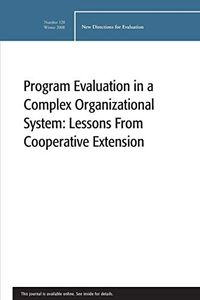
Program Evaluation in a Complex Organizational System: Lessons from Coopera Upplaga 1
This issue of New Directions for Evaluation focuses on evaluation in complex organizations. The themes that are examined the mainstreaming of evaluation within organizations, the growth of evaluation capacity, and the use of evaluation to promote organizational learning are relevant for evaluators who operate in environments marked by multiple organizational levels, varied funding streams, divergent purposes for evaluative information, and numerous stakeholders and organizational partners. The national Cooperative Extension System serves as a recurring case study that links the topics together. Cooperative Extension is a system of institutions that includes every state's land-grant universities, the U.S. Department of Agriculture, and local country governments. The linkages across professional communities and distinct institutions create a highly complex environment, presenting numerous challenges for evaluators working with community-based programs. Extension's experiences contribute to a rapidly evolving knowledge base about effective evaluation practice across a variety of organizational settings. This is the 120th volume of the Jossey-Bass quarterly thematic journal New Directions for Evaluation , an official publication of the American Evaluation Association. The journal publishes empirical, methodological, and theoretical works on all aspects of evaluation. Each issue is devoted to a single topic, with contributions solicited, organized, reviewed, and edited by a guest editor or editors. Issues may take any of several forms, such as a series of related chapters, a debate, or a long article followed by brief critical commentaries.
Upplaga: 1a upplagan
Utgiven: 2009
ISBN: 9780470447550
Förlag: John Wiley & Sons
Format: Häftad
Språk: Engelska
Sidor: 128 st
This issue of New Directions for Evaluation focuses on evaluation in complex organizations. The themes that are examined the mainstreaming of evaluation within organizations, the growth of evaluation capacity, and the use of evaluation to promote organizational learning are relevant for evaluators who operate in environments marked by multiple organizational levels, varied funding streams, divergent purposes for evaluative information, and numerous stakeholders and organizational partners. The national Cooperative Extension System serves as a recurring case study that links the topics together. Cooperative Extension is a system of institutions that includes every state's land-grant universities, the U.S. Department of Agriculture, and local country governments. The linkages across professional communities and distinct institutions create a highly complex environment, presenting numerous challenges for evaluators working with community-based programs. Extension's experiences contribute to a rapidly evolving knowledge base about effective evaluation practice across a variety of organizational settings. This is the 120th volume of the Jossey-Bass quarterly thematic journal New Directions for Evaluation , an official publication of the American Evaluation Association. The journal publishes empirical, methodological, and theoretical works on all aspects of evaluation. Each issue is devoted to a single topic, with contributions solicited, organized, reviewed, and edited by a guest editor or editors. Issues may take any of several forms, such as a series of related chapters, a debate, or a long article followed by brief critical commentaries.
Begagnad bok (0 st)
Varje vecka tillkommer tusentals nya säljare. Bevaka boken så får du meddelande när den finns tillgänglig igen.



